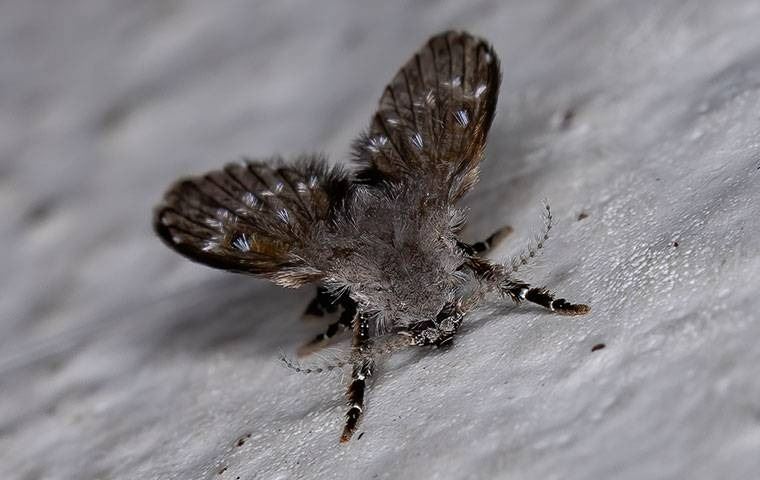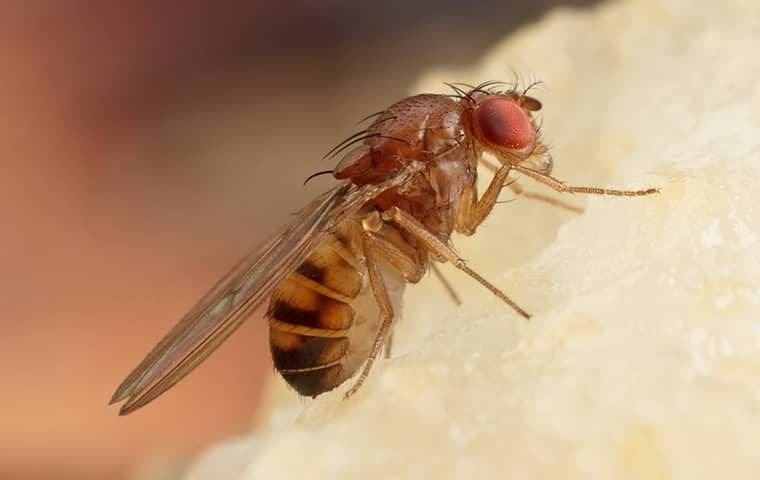
Preventing Flies Around Your Charlotte Home
There are a variety of flies in Charlotte. When you see a fly in your home, there are a few common culprits, but identifying and dealing with them is often frustrating because of the variety of species. For example, when you see small flies in your kitchen, you might think you have fruit flies. They are common kitchen pests, but sometimes tiny flies are not fruit flies. You may have an infestation of phorid flies, fungus gnats, drain flies, or some other plague of flies. All of these pests reproduce quickly and can create a swarm in your kitchen.
Another issue that is hard to navigate is all flies do not come from outside your home. Some of them hitchhike into your home. They may enter your home with food packages, potted plants, or something else, which makes prevention methods unique for them. If you're currently struggling with a fly problem, you need to know which flies you're dealing with, how they breed, and what works to control them. We recommend contacting us for assistance with fly control in Charlotte. But there are many ways you can keep flies out of your home without knowing anything about the specific species. Join us today as we dig into this topic and share our best tips for DIY fly prevention. If you need immediate help with fly control, connect with us. We offer advanced pest control in Charlotte. You'll be in good hands.

Why Flies Are A Serious Nuisance For Charlotte Homeowners
It isn't fun to have a fly land on your food, bang against window panes, or fill the air with annoying little black specks. There are many reasons to not want flies inside your home. But there are more reasons to want to nip this problem in the bud.
- They are incessant. Flies are wired for survival. If you don't address the source of flies, they're going to keep coming, and coming, and coming. That is incredibly annoying.
- They reproduce quickly. Some flies lay a startling number of eggs and can grow a population in your home faster than you can say, "Is that a fruit fly?" It is hard to control flies that reproduce quickly because they can make offspring faster than your traps can eliminate them.
- They spread harmful bacteria. The worst issue with having flies in your home is that they go from unsanitary areas to clean surfaces, dishes, and food. Some present more problems than others. The common house fly is known to transmit at least 65 diseases. Keep that in mind the next time one lands on your hot dog bun.
It is best to get proactive about fly control. Prevention is far better than waiting to get rid of flies after they start to bug you. Why wait until flies have already made you sick?
Comprehensive Guide To Fly Prevention

Now, it is time to dig into our main topic. Fly prevention is something you can do long before you see little black flies in your home, house flies beating their silly heads against your indoor window panes, or a pretty, metallic-colored bottle fly perched on your morning bagel. While these prevention methods don't require a knowledge of flies, some work only for specific flies. Keep that in mind if you're using these prevention tips to stop a certain kind of fly you're already dealing with in your home.
- Seal gaps and cracks. Flies use the tiniest of gaps to enter your home from the outside. They may slip through a sliver of a gap around a window screen and zip into your home when you open the window. They may pass through a gap in weatherstripping or a door sweep. A detailed inspection of your exterior and some simple repairs and patches can help to keep flies out.
- Keep lights off. Flies are insects and most insects are attracted to light. Most homes have exterior lights. There are many reasons to want lights around your exterior at night. Consider replacing white light with yellow. Why? Because flies can't see yellow light. Doing this is particularly important in entryways where flies can zip right into your home when you open the door.
- Store fruit in your fridge. When you bring fruit home, you may have eggs on the fruit. Consider storing your fruits in the fridge to prevent any eggs from hatching, and wash fruits before eating them.
- Check potted plants. When you bring potted plants back inside, check for any black fly activity. A common way fungus gnats get inside is by hitching a ride with plants. If you detect fly activity, treat the soil of the plant to eliminate hidden eggs before bringing plants inside.
- Keep trash covered. Doing this will provide a few benefits. A cover helps to contain the scent of your garbage, which can attract flies from a distance. It will prevent flies from getting into your trash and laying eggs. It will help to contain flies that hatch inside your trash. If you open the lid and flies come out, seal it quickly and bring the trash outdoors to dispose of it and clean the receptacle.
- Clean unused sinks. Some flies breed in drains. A common troublespot is a drain in a laundry room sink. Keeping your drains clean can help prevent trouble. You may also purchase a cap for your drain to protect it when it is not in use.
- Disinfect mops and buckets. Some flies are attracted to the scent of a dirty mop or mop bucket.
- Wash floors, surfaces, and shelves. Flies are looking for food sources. They are drawn to juice spills on the floor, honey or jam stuck on a shelf, or food debris on surfaces. Keep your home clean to remove food options.
- Keep food covered when it is sitting out on your counter. Many flies eat the food we eat. While they prefer decaying food, they aren't picky when they're hungry.
- Keep food in sealed containers. The reason to do this is mostly that it helps to seal the scent of food inside, particularly when food is past due and starts to have a fly-attracting aroma.
These basic steps will provide a lot of protection against fly infestations in your home. But there is one more piece to the prevention puzzle. There are conditions in your yard that can attract flies, promote fly development, and increase fly pressures. When fly pressures increase, you will keep having flies enter your home, even though you've taken steps to prevent them.
Common Mistakes Homeowners Make To Attract Flies
Every home is different. We don't know the conditions present in your yard, but we know some common conditions that can make fly control harder. Let's quickly look at them and discuss some options to help you correct these issues.
- Open trash. When your trash is left uncovered, it attracts flies from a distance and presents a breeding site for reproduction near your home. Cover exterior trash to help prevent this.
- Stinky trash. When your trash is not brought to the curb, the receptacle can start to stink. Soapy water is a simple fix.
- Position trash. Make sure your trash receptacles aren't near your exterior doors. We understand that it is convenient. Unfortunately, it places flies in a convenient location to go right in through your exterior door when you open it.
- Dog droppings. Some flies eat feces. Cleaning up dog waste or picking up waste during walks can help remove this.
- Livestock waste. Many people are getting chicken coops. Chickens provide eggs, and some hens eat ticks. But chickens also do something that attracts flies. They leave their droppings on the ground. Use fencing to keep chickens away from your exterior.
- Fruit on the ground. Do you have a fruit tree? It is hard to fix this issue. Cleaning up fruit from the ground can help. If you haven't planted a fruit tree yet, consider planting it away from your exterior.
- Fruit flies in compost. If you have compost outdoors, keep it away from your home and make sure it is properly mixed.
If your fly prevention isn't working, and you find yourself putting up fly paper, going after flies with sprays, or using some other targeted control method, it is time to call a professional. You can go after flies with a long list of control products and never get ahead of a fly problem.
Why Fly Infestations Require Professional Treatment
A professional doesn't treat the symptom of your fly problem; we go after the source. That source is often hard to locate and evaluate. The reason has to do with the point we made at the beginning of this article. We have many types of flies. Each fly has unique food, breeding, and habitat preferences. Our technicians zero in on trouble spots and address the zones where flies are breeding. We also provide exterior protection to help you keep flies and other pests out of your home all year long.
Connect with us today to learn more about the options available or to schedule service for your Charlotte home. When you have fly problems, we have fly solutions.
Customer Reviews
-
“He spent time educating us about "pests" and provided information regarding services with GoForth.”- Joyce C.
-
“Texted me before coming. Worked with me playing musical rooms with my dogs. I'll see how things are.”- Constance E.
-
“Amazing response time, reasonable prices, great customer service. Tevin was thorough and confident in his plan to fix our horrendous fire ant problem. We have had negative experiences with prior exterminators and probably waited way too long to call Go-For”- Ashley T.
-
“- Toya B.
We have been customers for almost 7 years for a reason. Our technician is the best. He always knows exactly how to address whatever pest has decided to bother us. We have referred them to many of our neighbors. Well worth the cost not to have to worry a
” -
“Answered all my questions and I felt their pricing was very reasonable.”- Deborah J.
-
“Brian went above and beyond what was expected, and I hope I get him again as my technician for future services!”- Tam L.
-
“He was thorough with inspecting and treating our home, which I really appreciate, and he took the time to answer my many questions.”- Jasmine B.
-
“Love the detailed summary and pics of what he did and saw! And did I mention how wonderful Olivia was to get us all set up?!!”- Beechy A.


Over the years, we’ve boiled down our mission to a core set of values:
-
Give A CrapDelight others by owning your role and saying yes. Take pride in how you appear & act & every other detail of the job. Be on time, attentive, & enthusiastic. Act as if the buck stops with you on every aspect of the job.
-
Chase PerfectionChase Perfection, knowing full well we will not reach it, but along the way we will catch excellence. Have a sense of urgency; Go-Forth Time - right now might be the only time you have to get it right.
-
Dig Deeper
Be an action-oriented professional that makes decisions based on evidence rather than stories & assumptions. Stay curious. Data can speak for itself.
Understand the cause of the fire rather than rushing to extinguish it.
-
Fight For SimplicityKeep it simple & consistent. Focus on how things should be done every time.
-
Face It, Fix ItConfront challenges directly and address issues head-on. A bias for action and powerful conversations drive our progress. It’s about getting it right rather than being right.
-
Grow!Growth is our purpose. Growing as people & growing our business.